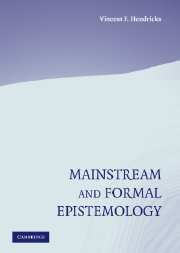9 - ‘Plethoric’ Epistemology
Published online by Cambridge University Press: 07 December 2009
Summary
Epistemology seems to enjoy an unexpectedly sexy reputation these days. A few years ago William Safire wrote a popular novel called The Sleeper Spy. It depicts a distinctly post-cold-war world in which it is no longer easy to tell the good guys – or, rather, the good spies – from the bad ones. To emphasize this sea change, Safire tells us that his Russian protagonist has not been trained in the military or the police, as he would have been during the old days, but as an epistemologist.
Jaakko Hintikka (2003b)Conceptual Analysis
One often hears that philosophy largely concerns conceptual analysis. Conceptual analysis is enjoying a revival these days after having been put to sleep for a number of years partly due to the stream of naturalism that has fled the philosophical landscape for the past 50 years or so.
In contemporary mainstream epistemology, the goal of these new conceptual exercises is to spell out and elucidate some of the epistemologically significant notions, like knowledge, justification and rationality, that ordinary folk use on a daily basis. An integral part of the elucidation process is to stretch the usage of these concepts to the max in order to reveal their limitations and what these limitations in turn reveal about the nature of human cognition. Seen from this perspective, conceptual analysis is focused on clarifying how words are used in everyday epistemic contexts.
The actual ‘stretching’ is performed by applying the method of ‘consulting intuitions about possible cases,’ as Jackson (1994) recently made a case for. Jackson takes conceptual analysis to be an indispensable part of intellectual activity in general.
- Type
- Chapter
- Information
- Mainstream and Formal Epistemology , pp. 151 - 166Publisher: Cambridge University PressPrint publication year: 2005



